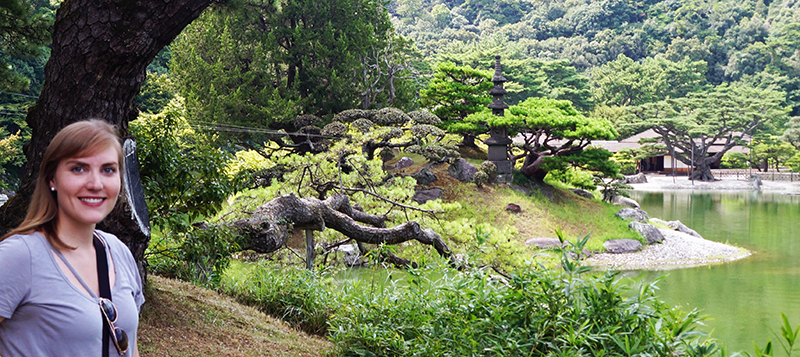 STEM equity researcher, National Science Foundation fellowship recipient, Ph.D. candidate, and sushi connoisseur Jeanna Wieselmann shares her research agenda as she spends the semester in Japan partnering with Shizuoka University.
STEM equity researcher, National Science Foundation fellowship recipient, Ph.D. candidate, and sushi connoisseur Jeanna Wieselmann shares her research agenda as she spends the semester in Japan partnering with Shizuoka University.
What is your degree program?
I am in the STEM Education Ph.D. program within the Department of Curriculum and Instruction. I plan to graduate in May of 2019.
What drove you to enroll in the STEM Education Ph.D. program?
I completed my undergraduate and master’s degrees from the University of Minnesota and spent several years teaching for a STEM non-profit. As a STEM teacher, I observed students who are traditionally underrepresented in STEM fields excelling. I wanted to learn more about how to make quality STEM education accessible to all students, through quality curricular materials and support for teachers. The University of Minnesota has amazing faculty and an integrated STEM program that perfectly matched my research interests.
What is your current research focus?
I am currently interested in gender equity in STEM and am looking at the factors that influence whether girls are interested in pursuing STEM careers. Girls already tend to have less interest in STEM by the time they reach middle and high school, so I’m focusing primarily on the elementary grade levels in the hopes that quality elementary STEM experiences can help foster continued STEM interest.
You are in Japan this semester working on STEM education. Tell me about your goals for the semester and how the project came about.
I am interested in international perspectives on STEM, and I decided to visit Japan because my adviser, Dr. Gillian Roehrig, has cultivated a strong relationship with Dr. Yoshisuke Kumano from Shizuoka University. I was able to study through my National Science Foundation Graduate Research Fellowship. This semester, I am working on two research projects. The first project investigates middle school students’ perceptions of STEM and interest in STEM careers after participating in STEM activities through various programs. The second project involves helping with teacher professional development focused on STEM and supporting these teachers as they implement STEM activities in their elementary classrooms for the first time.
What have you found surprising/challenging as an educator and researcher working across international borders?
This certainly hasn’t been a surprise, but the language barrier is a major challenge to conducting research across international borders. I’m fortunate to be surrounded by Japanese colleagues who are willing to help me, but my ability to understand what is happening in a classroom is limited. As a researcher, I’m also very aware of my positionality and am cautious about entering a new culture and pushing my beliefs and values on people. I’m working in collaborative groups with Japanese researchers to help ensure that the Japanese perspective is fairly portrayed in the research I conduct.
Which resources have you found through the department to help with your research?
The biggest resource that has helped with my research is the faculty within the department. I learned a lot through my coursework, and I also have wonderful mentors who are willing to give advice and feedback on my work. Every time I talk to another professor about my research, I leave with new ideas and new resources to explore. In addition, my fellow graduate students are irreplaceable for the support they provide.
And the key question: have you eaten the most delicious food in Japan?
The food in Japan is absolutely amazing! There’s great, affordable sushi available everywhere, including the grocery store that’s a block away from my apartment. One of my favorite meals was Okonomiyaki, a regional specialty of Hiroshima that features a savory pancake topped with cabbage and other veggies, noodles, meat, and a delicious special sauce.
Learn more about the Ph.D. in STEM Education in the Department of Curriculum and Instruction.



